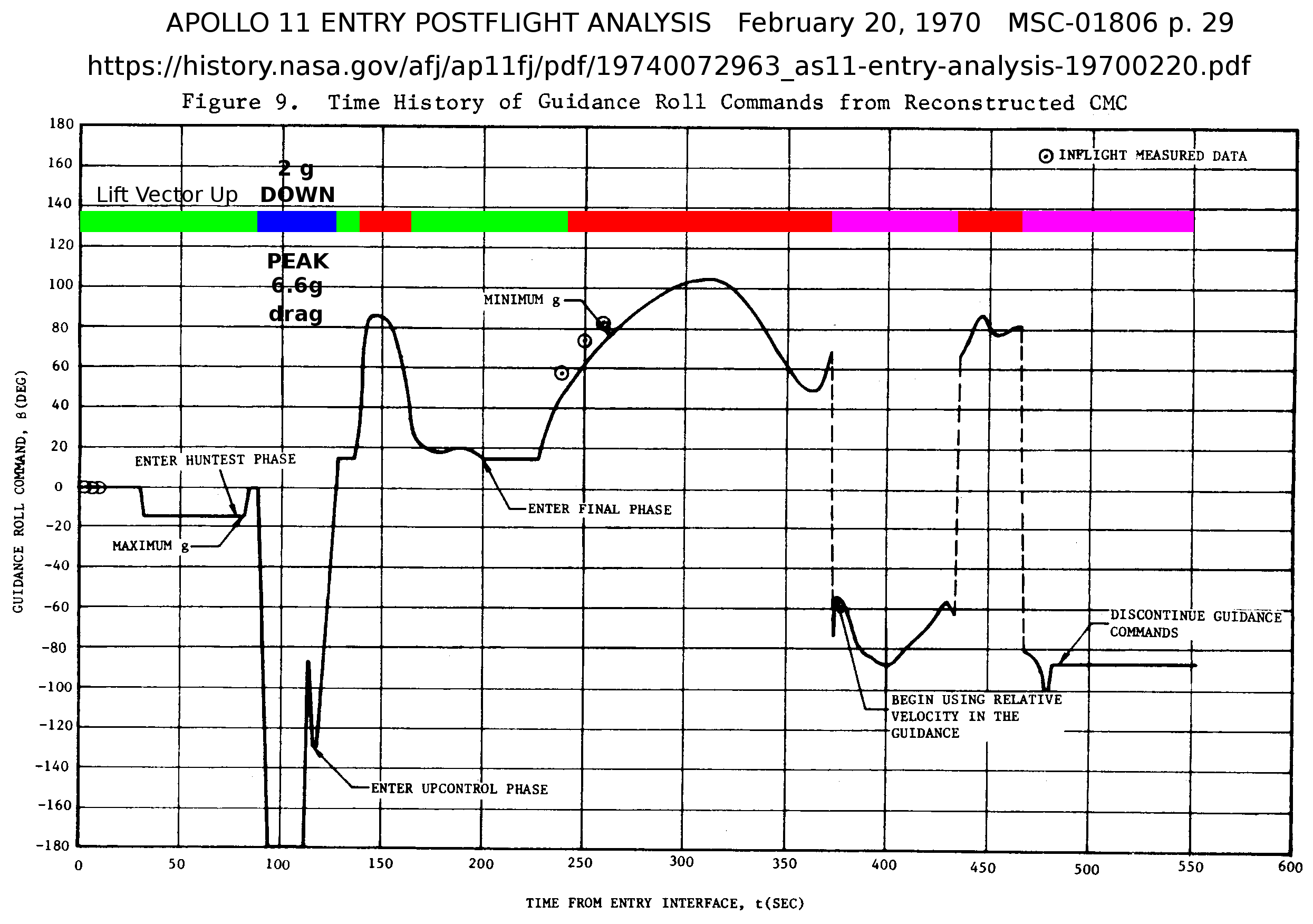|
Size: 2375
Comment:
|
← Revision 24 as of 2017-11-27 01:03:32 ⇥
Size: 2382
Comment:
|
| Deletions are marked like this. | Additions are marked like this. |
| Line 18: | Line 18: |
| Mars Science Laboratory (MSL) Curiousity used a similar entry profile, though it came in at 6230 km/s, about 1.76 times v,,circular,, ≈ 3540 m/s . With a similar L/D 0.3 as Apollo, and bending into a smaller radius entry corridor with less Martian gravity to supplement the downwards lift, MSL entry acceleration peaked at 12.5 gees. My guess is that could have been reduced. However, more time in the highly variable Martian atmosphere would have made the entry footprint error much larger. A lower gee entry might require much more terminal rocket maneuvering thrust for a pinpoint landing, for instance to land right next to (but not on top of) a previously delivered cargo lander. | Mars Science Laboratory (MSL) Curiousity used a similar entry profile, though it came in at 6230 km/s, about 1.76 times v,,circular,, ≈ 3540 m/s . With a similar L/D 0.3 as Apollo, and bending into a smaller radius entry corridor with less Martian gravity to supplement the downwards lift, MSL entry acceleration peaked at 12.5 gees. My guess is that could have been reduced. However, more time in the highly variable Martian atmosphere would have made the entry footprint error much larger. A lower gee entry might require much more terminal rocket maneuvering thrust for a pinpoint landing, for instance to land within 100 meters of (but not on top of) a previously delivered cargo lander. |
Apollo 11 docs
Apollo 11 technical summary nothing about entry
Apollo 11 Mission Report speed and max gees, no L/D
Apollo 11 Entry Postflight Analysis with entry details like roll and skip
Apollo entered from the Moon at 11.2 km/s, just below escape velocity, about 1.4 times vcircular. This is called supercircular entry, and downwards lift is required to keep the trajectory within the entry corridor long enough to slow down below vcircular. Unlike the other lunar entry missions, Apollo 11 performed a shallow skip of a few hundred kilometers, so it could descend downrange from a storm. A larger skip would have cost half an orbit or more, and there was not enough consumables onboard for the astronauts to survive for many hours.
Color annotations added to the original NASA graph by KHL. Blue is about 20 seconds of lift vector down (force down, feet up), holding the trajectory within the entry corridor. Green is lift vector up, force holding the spacecraft up, though this occurs above the entry corridor, in thinner atmosphere so the total lift is small. Red and Magenta are rolls to the side, adjusting trajectory azimuth (horizontal angle) without up or down lift. download larger image

Mars Science Laboratory (MSL) Curiousity used a similar entry profile, though it came in at 6230 km/s, about 1.76 times vcircular ≈ 3540 m/s . With a similar L/D 0.3 as Apollo, and bending into a smaller radius entry corridor with less Martian gravity to supplement the downwards lift, MSL entry acceleration peaked at 12.5 gees. My guess is that could have been reduced. However, more time in the highly variable Martian atmosphere would have made the entry footprint error much larger. A lower gee entry might require much more terminal rocket maneuvering thrust for a pinpoint landing, for instance to land within 100 meters of (but not on top of) a previously delivered cargo lander.
